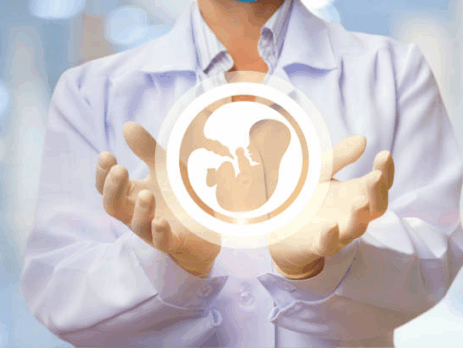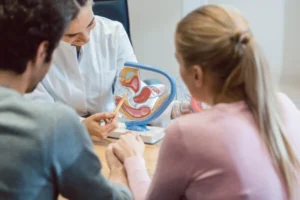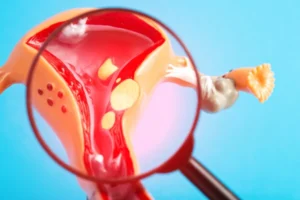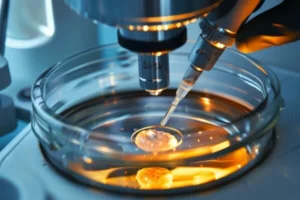What to Do When You’re Facing Unexplained Infertility
Dealing with infertility is a highly personal and emotional experience. It can be frustrating and upsetting when you can't figure out why you can't get pregnant. At Southern California Fertility Center (SCFC) in La Jolla, we know how difficult it is when infertility has no known cause. You may have done all the "right" things, like tracked ovulation, taken supplements, and scheduled tests, only to be told that everything looks normal, yet pregnancy has not occurred.
Led by Dr. Nastaran Foyouzi, a reproductive endocrinologist and OB/GYN infertility specialist with a subspecialty in genetics, SCFC provides clarity, compassion, and a highly personalized approach to infertility treatment. Dr. Foyouzi and her team have helped with over 10,000 successful births and are known across the country for their excellent work in genetic testing and innovative approaches to assist with fertility and pregnancy. They're ready to guide you through this tough time. In this blog, we take a deeper look at infertility, offer insights, support, and resources for all individuals facing infertility.
What Unexplained Infertility Means
 Unexplained infertility is diagnosed when standard fertility tests such as semen analysis, ovulation tracking, hormone level assessments, and evaluations of the fallopian tubes show normal results. Yet, pregnancy does not occur after 12 months of trying (or 6 months if you are over 35). This condition accounts for approximately 10–30% of infertility cases.
Unexplained infertility is diagnosed when standard fertility tests such as semen analysis, ovulation tracking, hormone level assessments, and evaluations of the fallopian tubes show normal results. Yet, pregnancy does not occur after 12 months of trying (or 6 months if you are over 35). This condition accounts for approximately 10–30% of infertility cases.
Getting an unexplained infertility diagnosis is confusing. This means you have no clear answers and are often left with more questions.
The Biggest Cause of Unexplained Infertility
When doctors talk about "unexplained infertility," it means they haven't found the cause yet, even though there is one. Often, the reasons are minor issues that regular tests can't detect, including:
- Egg quality problems that standard ovulation or hormone tests do not detect
- Sperm function defects, even if the count and motility appear normal
- Issues with embryo implantation related to uterine receptivity or immune system responses
- Subclinical endometriosis or inflammation
- Genetic mismatches or chromosomal abnormalities that hinder successful development
- Age-related infertility: Age-related infertility is the decline in fertility that occurs as individuals, especially women, grow older due to decreased egg quality and quantity
Dr. Nastaran Foyouzi, a leading  reproductive endocrinologist at Southern California Fertility Center, helps women overcome pregnancy challenges. With thousands of successful births, she specializes in treating conditions like PCOS, endometriosis, and diminished ovarian reserve. Dr. Foyouzi also focuses on reproductive genetics, using advanced testing methods such as Preimplantation Genetic Testing (PGT) to check embryos for chromosomal abnormalities before implantation.
reproductive endocrinologist at Southern California Fertility Center, helps women overcome pregnancy challenges. With thousands of successful births, she specializes in treating conditions like PCOS, endometriosis, and diminished ovarian reserve. Dr. Foyouzi also focuses on reproductive genetics, using advanced testing methods such as Preimplantation Genetic Testing (PGT) to check embryos for chromosomal abnormalities before implantation.
The First Step Treatment for Unexplained Infertility
 At Southern California Fertility Center, we first try the simplest and most proven methods that fit your age, family plans, and how much time you have. A common first step in treatment might be:
At Southern California Fertility Center, we first try the simplest and most proven methods that fit your age, family plans, and how much time you have. A common first step in treatment might be:
- Helping You Ovulate with Timed Intercourse or Intrauterine Insemination (IUI): This involves using pills like Clomid or letrozole to help you release an egg. Then, you'll either have intercourse at a specific time, or we'll put sperm right into your uterus (IUI).
- Lifestyle Optimization: We assess factors like your body mass index (BMI), stress levels, sleep quality, and environmental exposures. Even minor adjustments in these areas can lead to improvements in hormonal balance and reproductive health.
- Baseline Testing and Imaging: We conduct tests such as the Anti-Müllerian Hormone (AMH) test, Hysterosalpingogram (HSG), and ultrasounds to ensure that no subtle factors affecting fertility have been overlooked.
For more information about common fertility barriers and treatment options, please explore our SCFC Services for Common Conditions Preventing Pregnancy.
How to Handle Infertility When the Cause is Unknown
 Dealing with infertility that has no clear cause requires a strategy, support, and medical knowledge. At SCFC, we believe it's important to find the reason behind your infertility, even when it's not obvious. Here is how we assist our patients:
Dealing with infertility that has no clear cause requires a strategy, support, and medical knowledge. At SCFC, we believe it's important to find the reason behind your infertility, even when it's not obvious. Here is how we assist our patients:
- Care Designed for You: We start with thorough check-ups and honest talks before trying strong treatments. If the first treatments don't work after three to six tries, we'll change the plan to suit you.
- Modern IVF Choices: If needed, In Vitro Fertilization (IVF) can be a helpful next step. At SCFC, we tailor our IVF plans to meet your needs, offering options like Mini IVF, Natural IVF, or Gender Selection IVF, depending on your preferences. For many patients whose infertility is unexplained, IVF with Preimplantation Genetic Testing (PGT-A or PGT-M) helps find embryos with chromosome problems that might otherwise be missed.
- Advanced Genetic Tests: Dr. Foyouzi's extensive knowledge of reproductive genetics allows us to offer genetic matching, chromosome checks, and embryo analysis. These tests help us work toward the best possible health results.
- Improving Ovarian Function: Some patients may benefit from Platelet-Rich Plasma (PRP) therapy, which can help rejuvenate the ovaries. PRP may enhance egg quality and support ovulation, especially for women in their late 30s and early 40s.
- Emotional Health: Fertility involves more than just physical health, as stress, sadness, and uncertainty can influence your hormones and overall well-being. That's why we offer emotional support, fertility guidance, and stress-relief techniques as part of your treatment.
A Message of Hope
 Just because the reason for your infertility is unknown doesn't mean it can't be treated. It just means more investigation is needed, and we are here to assist. At Southern California Fertility Center, we use the latest technology and a comprehensive approach to provide you with effective treatments and optimism.
Just because the reason for your infertility is unknown doesn't mean it can't be treated. It just means more investigation is needed, and we are here to assist. At Southern California Fertility Center, we use the latest technology and a comprehensive approach to provide you with effective treatments and optimism.
At Southern California Fertility Center, we use advanced technology and a caring approach to provide effective treatments and hope. Whether you're new to this process or have been looking for solutions for a while, we're here to help. With Dr. Foyouzi's support and our dedicated staff, we will help you understand your situation better and move forward with optimism.
📍 Visit us in La Jolla or schedule your initial consultation today.
1. What are the signs of poor egg quality?Poor egg quality can be difficult to identify without fertility testing, but some signs may include difficulty conceiving, multiple miscarriages, or failed IVF cycles. Women may also experience irregular or absent periods, as well as poor embryo quality during fertility treatments.
2. How can I improve my egg quality naturally?Improving egg quality naturally can be achieved by adopting a healthy lifestyle. Focus on a fertility-boosting diet rich in antioxidants, healthy fats, and lean proteins. Reducing exposure to toxins, quitting smoking, limiting alcohol, and managing stress through acupuncture or meditation can also help improve egg health.
3. What causes poor egg quality?Poor egg quality can be caused by various factors, including aging (especially after 35), hormonal imbalances, genetic abnormalities, lifestyle choices (such as smoking and excessive alcohol), and environmental toxins. Chronic health conditions and certain medications can also affect egg quality.
4. What foods help improve egg quality?Foods rich in antioxidants, healthy fats, and essential vitamins can help improve egg quality. Consider adding foods such as leafy greens (like spinach), berries, nuts (like walnuts), fatty fish (such as salmon), and whole grains (like quinoa) to your diet. These foods support hormonal balance and reduce oxidative stress.
5. Can acupuncture improve egg quality?Yes, acupuncture can help improve egg quality by promoting blood circulation to the ovaries and balancing hormone levels. It has been shown to support overall fertility by reducing stress and improving ovarian function. Many women incorporate acupuncture alongside other fertility treatments to enhance their chances of conception.
6. Is it possible to get pregnant with poor egg quality?While poor egg quality can make conception more difficult, it is still possible to get pregnant. For women with poor egg quality, assisted reproductive technologies like IVF (with egg retrieval) or egg donation can increase the chances of a successful pregnancy. It’s essential to consult a fertility specialist to explore the best options for your situation.
7. What supplements are helpful for improving egg quality?Supplements like Coenzyme Q10 (CoQ10), Vitamin D, Myo-Inositol, and Folic Acid are commonly recommended to improve egg quality. These supplements help enhance mitochondrial function in eggs, regulate reproductive hormones, and support overall fertility. Consult with your doctor before starting any supplementation.
8. Can late ovulation affect egg quality?Late ovulation can sometimes be associated with poor egg quality. Eggs released later in the cycle may not be as viable, and hormonal imbalances can affect ovulation timing. If you’re experiencing late ovulation or irregular cycles, it’s a good idea to consult a fertility expert for evaluation and advice on improving egg quality.







 The first step is to recognize that seeking help is a sign of strength, not failure. Whether you have been trying to conceive for months or years, connecting with a fertility specialist can provide you with clarity and direction. A reproductive endocrinologist can assess your health, explore treatment options, and create a personalized fertility plan.
The first step is to recognize that seeking help is a sign of strength, not failure. Whether you have been trying to conceive for months or years, connecting with a fertility specialist can provide you with clarity and direction. A reproductive endocrinologist can assess your health, explore treatment options, and create a personalized fertility plan. The emotional toll of infertility can lead to feelings of depression and anxiety. Many individuals experience feelings of inadequacy, loss of control, and social isolation, especially when they are surrounded by others who are pregnant or parenting. These emotions can intensify the overall burden of infertility.
The emotional toll of infertility can lead to feelings of depression and anxiety. Many individuals experience feelings of inadequacy, loss of control, and social isolation, especially when they are surrounded by others who are pregnant or parenting. These emotions can intensify the overall burden of infertility. Dr. Nastaran Foyouzi
Dr. Nastaran Foyouzi
 Fertility treatment refers to any medical procedure or therapy aimed at improving the chances of conception for individuals or couples who are struggling to get pregnant. These treatments can range from medications to help conceive to advanced procedures like
Fertility treatment refers to any medical procedure or therapy aimed at improving the chances of conception for individuals or couples who are struggling to get pregnant. These treatments can range from medications to help conceive to advanced procedures like Eating a balanced diet rich in vitamins and nutrients can positively impact your fertility. Foods like leafy greens, berries, lean proteins, and whole grains can support hormone balance and reproductive health. Consider incorporating the following into your meals:
Eating a balanced diet rich in vitamins and nutrients can positively impact your fertility. Foods like leafy greens, berries, lean proteins, and whole grains can support hormone balance and reproductive health. Consider incorporating the following into your meals: 3. In Vitro Fertilization (IVF)
3. In Vitro Fertilization (IVF) Knowing when to seek professional fertility help is crucial in your fertility journey. If you’ve been trying to conceive for over a year (or six months if you’re over 35), it may be time to consult a fertility specialist. The specialists at SC Fertility Center can evaluate both partners' reproductive health and recommend the most appropriate treatments.
Knowing when to seek professional fertility help is crucial in your fertility journey. If you’ve been trying to conceive for over a year (or six months if you’re over 35), it may be time to consult a fertility specialist. The specialists at SC Fertility Center can evaluate both partners' reproductive health and recommend the most appropriate treatments. The cost of fertility treatments can vary widely based on factors such as the type of treatment, location, and whether additional procedures (like egg retrieval) are necessary. On average, IVF treatments can cost anywhere from $12,000 to $15,000 per cycle, with additional costs for medications and testing.
The cost of fertility treatments can vary widely based on factors such as the type of treatment, location, and whether additional procedures (like egg retrieval) are necessary. On average, IVF treatments can cost anywhere from $12,000 to $15,000 per cycle, with additional costs for medications and testing. At SC Fertility Center, we are committed to helping you achieve your dream of parenthood. Our team of fertility specialists offers personalized care and the latest treatments to support you every step of the way. From fertility medication to IVF treatments, we provide a wide range of options tailored to your unique needs.
At SC Fertility Center, we are committed to helping you achieve your dream of parenthood. Our team of fertility specialists offers personalized care and the latest treatments to support you every step of the way. From fertility medication to IVF treatments, we provide a wide range of options tailored to your unique needs.
 Egg retrieval, also known as oocyte aspiration, is the process of collecting eggs from a woman’s ovaries for fertilization in the IVF procedure. This step is vital for IVF success as it creates the possibility of embryo development, which will later be transferred into the uterus.
Egg retrieval, also known as oocyte aspiration, is the process of collecting eggs from a woman’s ovaries for fertilization in the IVF procedure. This step is vital for IVF success as it creates the possibility of embryo development, which will later be transferred into the uterus. IVF Injections
IVF Injections The ovarian stimulation phase is a critical time during IVF, and following certain guidelines can improve your chances of success. Here are the key dos and don’ts during IVF stimulation:
The ovarian stimulation phase is a critical time during IVF, and following certain guidelines can improve your chances of success. Here are the key dos and don’ts during IVF stimulation: After the egg retrieval procedure, there are some important things to avoid to help your body recover and support your IVF journey.
After the egg retrieval procedure, there are some important things to avoid to help your body recover and support your IVF journey.
 The egg retrieval process in IVF is a crucial step, and understanding the role of IVF medications, side effects, and post-retrieval care is essential for a successful journey. Follow the recommended dos and don’ts, take care of your body with the right diet, and maintain an open line of communication with your fertility specialist throughout the process.
The egg retrieval process in IVF is a crucial step, and understanding the role of IVF medications, side effects, and post-retrieval care is essential for a successful journey. Follow the recommended dos and don’ts, take care of your body with the right diet, and maintain an open line of communication with your fertility specialist throughout the process.
 access to a wide range of advanced fertility treatments, including In Vitro Fertilization (IVF), Intrauterine Insemination (IUI), Pre-Implantation Genetic Testing, and Oncofertility services. The center also specializes in Gender Selection IVF, Natural IVF, and Ovarian Rejuvenation therapies. Understanding the diverse needs of the community, SCFC offers tailored programs for LGBTQ families, as well as options for egg donation, surrogacy, and social egg and sperm freezing.
access to a wide range of advanced fertility treatments, including In Vitro Fertilization (IVF), Intrauterine Insemination (IUI), Pre-Implantation Genetic Testing, and Oncofertility services. The center also specializes in Gender Selection IVF, Natural IVF, and Ovarian Rejuvenation therapies. Understanding the diverse needs of the community, SCFC offers tailored programs for LGBTQ families, as well as options for egg donation, surrogacy, and social egg and sperm freezing. The compassionate team at SCFC is made up of highly skilled professionals dedicated to providing exceptional care. Dr. Leizhen Wei, the Lab Manager and Lab Director, brings extensive experience in embryology and andrology, ensuring the highest standards in laboratory procedures and patient outcomes. Alongside Dr. Foyouzi and the rest of the expert team, SCFC remains committed to guiding patients through every step of their fertility journey with the utmost care and expertise.
The compassionate team at SCFC is made up of highly skilled professionals dedicated to providing exceptional care. Dr. Leizhen Wei, the Lab Manager and Lab Director, brings extensive experience in embryology and andrology, ensuring the highest standards in laboratory procedures and patient outcomes. Alongside Dr. Foyouzi and the rest of the expert team, SCFC remains committed to guiding patients through every step of their fertility journey with the utmost care and expertise.
 Dr. Foyouzi combines cutting-edge reproductive medicine with a holistic approach to fertility care, considering factors such as genetic health, lifestyle, and overall well-being in developing personalized treatment plans. SCFC provides a full spectrum of services, including IVF, IUI, Mini IVF, Pre-Implantation Genetic Testing (PGT), gender selection, ovarian rejuvenation, egg and sperm freezing, and specialized care for LGBTQ+ families and patients undergoing cancer treatments.
Dr. Foyouzi combines cutting-edge reproductive medicine with a holistic approach to fertility care, considering factors such as genetic health, lifestyle, and overall well-being in developing personalized treatment plans. SCFC provides a full spectrum of services, including IVF, IUI, Mini IVF, Pre-Implantation Genetic Testing (PGT), gender selection, ovarian rejuvenation, egg and sperm freezing, and specialized care for LGBTQ+ families and patients undergoing cancer treatments. Located in La Jolla, SCFC provides fertility treatments ranging from IVF to egg freezing and genetic testing. The clinic is led by Dr. Nastaran Foyouzi and focuses on evidence-based reproductive care.
Located in La Jolla, SCFC provides fertility treatments ranging from IVF to egg freezing and genetic testing. The clinic is led by Dr. Nastaran Foyouzi and focuses on evidence-based reproductive care.
 Trying to conceive can be an exciting experience, but it often comes with unexpected challenges for many couples. If you’ve been having difficulty getting pregnant, you’re not alone; 1 in 8 couples experience infertility. The good news is that most fertility issues have solutions.
Trying to conceive can be an exciting experience, but it often comes with unexpected challenges for many couples. If you’ve been having difficulty getting pregnant, you’re not alone; 1 in 8 couples experience infertility. The good news is that most fertility issues have solutions. Several medical conditions can interfere with conception. The most common ones include:
Several medical conditions can interfere with conception. The most common ones include: In addition to medical conditions, lifestyle, and environmental factors can lower fertility:
In addition to medical conditions, lifestyle, and environmental factors can lower fertility: Infertility
Infertility Here are five major causes of infertility that affect both men and women:
Here are five major causes of infertility that affect both men and women: At Southern California Fertility Center, they offer personalized fertility treatments tailored to individual needs, including:
At Southern California Fertility Center, they offer personalized fertility treatments tailored to individual needs, including:

 For some couples, the path to parenthood is filled with unexpected hurdles. Infertility, recurrent pregnancy loss, or concerns about hereditary genetic conditions can make the dream of having a child feel out of reach. At the Southern California Fertility Center (SCFC) in La Jolla, California, under the leadership of Dr. Nastaran Foyouzi, advanced reproductive technologies like preimplantation genetic testing (PGT) are transforming lives and creating families.
For some couples, the path to parenthood is filled with unexpected hurdles. Infertility, recurrent pregnancy loss, or concerns about hereditary genetic conditions can make the dream of having a child feel out of reach. At the Southern California Fertility Center (SCFC) in La Jolla, California, under the leadership of Dr. Nastaran Foyouzi, advanced reproductive technologies like preimplantation genetic testing (PGT) are transforming lives and creating families. Preimplantation Genetic Testing (PGT) is a valuable tool for couples undergoing in vitro fertilization (IVF), providing numerous benefits. At SCFC, Dr. Foyouzi and her team use PGT to examine embryos for genetic abnormalities, ensuring that only the healthiest embryos are selected for transfer. This process not only increases the likelihood of a successful pregnancy but also reduces the emotional and financial stress associated with unsuccessful cycles or miscarriages.
Preimplantation Genetic Testing (PGT) is a valuable tool for couples undergoing in vitro fertilization (IVF), providing numerous benefits. At SCFC, Dr. Foyouzi and her team use PGT to examine embryos for genetic abnormalities, ensuring that only the healthiest embryos are selected for transfer. This process not only increases the likelihood of a successful pregnancy but also reduces the emotional and financial stress associated with unsuccessful cycles or miscarriages. Preimplantation genetic screening (PGS) is closely linked to the IVF process. After eggs are retrieved and fertilized in the lab, the embryos are cultured for several days until they reach the blastocyst stage. At this point, a biopsy removes a few cells for genetic analysis, ensuring the embryo's viability is not compromised.
Preimplantation genetic screening (PGS) is closely linked to the IVF process. After eggs are retrieved and fertilized in the lab, the embryos are cultured for several days until they reach the blastocyst stage. At this point, a biopsy removes a few cells for genetic analysis, ensuring the embryo's viability is not compromised. The combination of IVF and preimplantation genetic diagnosis (PGD) has dramatically enhanced success rates, especially for couples facing specific genetic disorders or recurrent pregnancy loss. PGD focuses on detecting specific genetic mutations, allowing for the selection of embryos free from inherited conditions.
The combination of IVF and preimplantation genetic diagnosis (PGD) has dramatically enhanced success rates, especially for couples facing specific genetic disorders or recurrent pregnancy loss. PGD focuses on detecting specific genetic mutations, allowing for the selection of embryos free from inherited conditions. IVF with genetic testing, including both PGT and PGD, boasts significantly higher success rates compared to standard IVF cycles. By screening embryos for chromosomal abnormalities, the chances of implantation increase while the risk of miscarriage decreases. At SCFC, patients have seen up to a 30% improvement in success rates with genetic testing.
IVF with genetic testing, including both PGT and PGD, boasts significantly higher success rates compared to standard IVF cycles. By screening embryos for chromosomal abnormalities, the chances of implantation increase while the risk of miscarriage decreases. At SCFC, patients have seen up to a 30% improvement in success rates with genetic testing. Fertility challenges can be overwhelming, but with the right team by your side, hope is always within reach. At SCFC, Dr. Nastaran Foyouzi and her team are dedicated to guiding you through every step of your fertility journey, from diagnosis to treatment and beyond. Whether you're exploring IVF with genetic testing or seeking reassurance about your options, SCFC provides the expertise and care you deserve. Learn more about
Fertility challenges can be overwhelming, but with the right team by your side, hope is always within reach. At SCFC, Dr. Nastaran Foyouzi and her team are dedicated to guiding you through every step of your fertility journey, from diagnosis to treatment and beyond. Whether you're exploring IVF with genetic testing or seeking reassurance about your options, SCFC provides the expertise and care you deserve. Learn more about